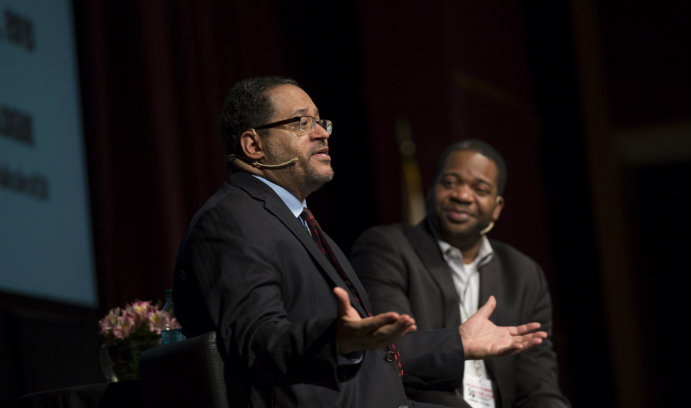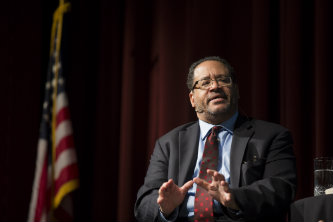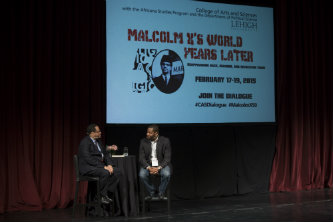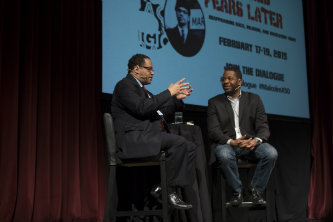‘A gentle spirit with a fierce rhetoric’

Michael Eric Dyson (left) joined James Peterson, associate professor of English, for a discussion of Malcolm X's lasting legacy.
Perched on a stool on the stage of Baker Hall in the Zoellner Arts Center, Michael Eric Dyson, professor of sociology at Georgetown University, didn’t mince words. Dyson engaged in a candid conversation with James Peterson, associate professor of English, about the lasting legacy of Malcolm X and its significance today in a keynote titled “Malcolm X’s Influence: 50 Years.”
Human rights leader Malcolm X was gunned down at the age of 39 by members of the Nation of Islam on Feb. 21, 1965. Dyson’s 1994 book, Making Malcolm: The Myth and Meaning of Malcolm X, was a New York Times notable book of the year.
Dyson described Malcolm X as a man of high intellectual pedigree who read widely and deeply. The self-taught leader’s style, Dyson said, included “the debate tactic of engaging wicked humor and enormous erudition.”
Disputing the notion that Malcolm X was a hostile man, Dyson instead described him as extremely humble, a “gentle spirit with a fierce rhetoric.”
“This man understood that [he was] at war against a proposition of white supremacy which has a corollary and invidious and insidious belief in black inferiority. And he had to argue against that. He had to throw everything he had against that. But [he did so] as a human being of such enormous dignity and modesty, which is unusual for leaders in this day and age. You don’t find many leaders of any color with that genuine humility,” Dyson said.
Malcolm X was also extremely self-critical, Dyson said, noting that his autobiographical narrative—“so relentlessly self-examining”—should be “held up as a paradigm for other leaders.”
Dyson addressed the public’s tendency to categorize leaders in binary constructions, as is the case with Malcolm X and Martin Luther King, Jr. Generalizations, Dyson said, do a disservice to the work and evolution of each man.
“I think it’s incredibly important to talk about black leadership as an ongoing and contested moment of expression, so that when you look at a figure like Malcolm X versus Martin Luther King, Jr.—one is integrationist, one who is black nationalist—[it] really doesn’t begin to embrace the complexity of either person. … In his own development, Malcolm X was an incredibly complicated figure. ... When you look at one versus the other, it really dishonors Malcolm X’s relentless evolutions,” Dyson said.
Peterson questioned Dyson about “Operation Ghetto Storm,” the recently updated report published in 2012 by the Malcolm X Grassroots Committee, which examines the “state-sanctioned murders of black and Latino youth in the United States.”
“When we think about Malcolm X’s legacy, this is a centerpiece of what he was interested in. He fully understood that black communities were under duress—under attack—by law enforcement, and that state-sanctioned murders were happening then. What we know from the [report] is that things are much bigger and much more pervasive than what we think about.
“That report really helped shine a powerful spotlight on the fact [that] this is not an abnormality. A lot of black people and brown people and, for that matter, poor white people, are being murdered in this country every day without public recognition, without celebration. … Black death is the necessary scapegoat, literally the sacrificial lamb, for the perpetuation of white civic existence, starting from slavery.”
Dyson also spoke about Malcolm X’s legacy in terms of our understanding of Islam in the United States, noting the danger of assuming that the violent acts of some represent an entire religion.
“You’ve got to slow down and challenge the extremist viewpoints in any religion,” Dyson said.
He noted that the Bible was often used to justify slavery, Jim Crow laws, cross burnings and lynching.
“Christianity and the cross are intimately bound—so when they were burning crosses, that’s Christian terror. … [But] we don’t want to recognize it in ourselves.
“I believe in faith, I believe in spirituality … but religion is tough. It has a lot of great stuff and a lot of horrible stuff. And when I see religious people making more victims of their fellow human beings, I think that this is not what religion is for.”
Named by Ebony as one of the hundred most influential black Americans, Dyson is the author of sixteen books, including Come Hell or High Water: Hurricane Katrina and the Color of Disaster and April 4, 1968: Martin Luther King, Jr.’s Death and How It Changed America. Dyson has been a commentator on National Public Radio and CNN, is a regular guest on Real Time with Bill Maher, and serves as a political analyst for MSNBC.
Dyson’s keynote speech was part of “Malcolm X’s World 50 Years Later: Reappraising Race, Religion and Revolution Today,” a three-day conference hosted by Lehigh’s College of Arts and Sciences, the Africana Studies program and the political science department to commemorate the 50th anniversary of the human rights activist’s assassination.
The conference continues with its final day of programming tomorrow, Thursday, Feb. 19.
Story by Kelly Hochbein
Photos by Christa Neu
Posted on:




